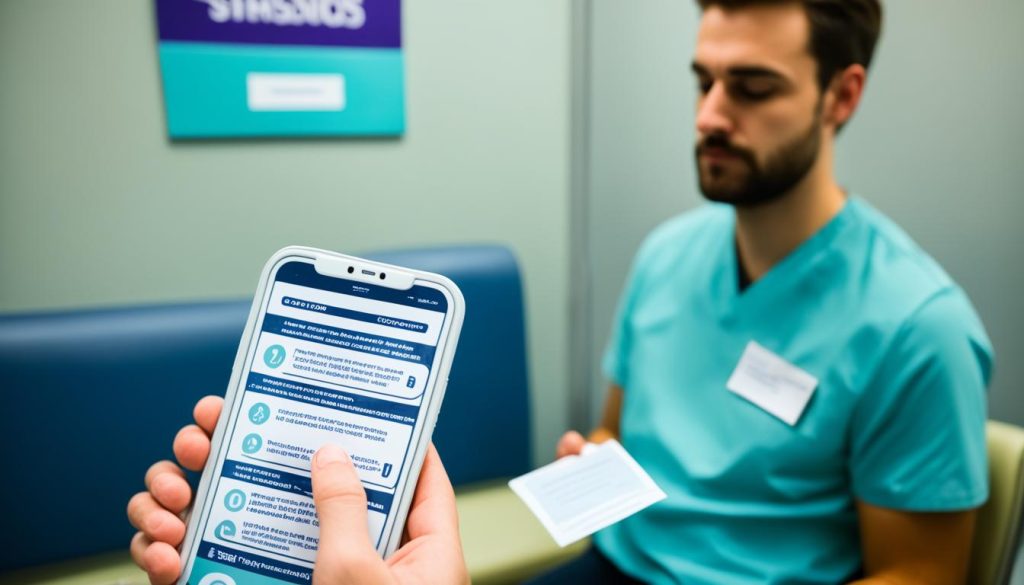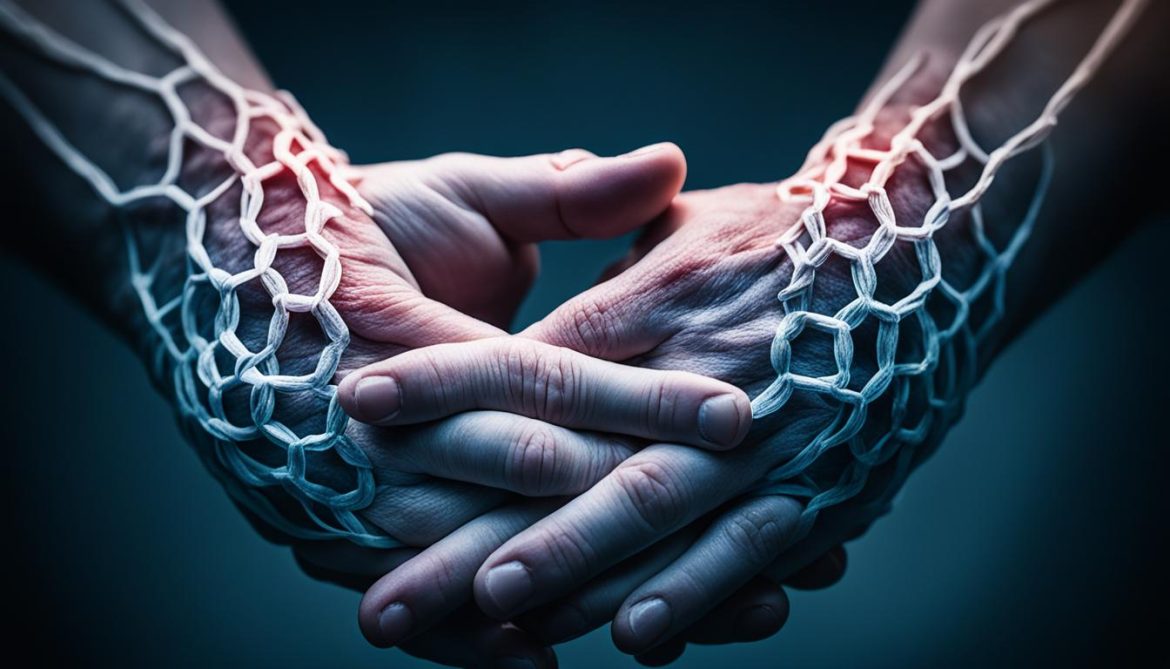Can you get an STD from a handjob? It’s a common question that many people have, and understanding the risks associated with sexual activities is crucial for maintaining sexual health. While the risk of contracting a sexually transmitted disease (STD) from a handjob is generally low, it is still important to be aware of the potential risks and take necessary precautions.
According to multiple sources, including reputable health organizations, the risk of transmitting STDs through handjobs is generally low. However, it is still possible to transmit certain STDs through skin-to-skin contact or contact with bodily fluids. It is important to practice safe sexual behaviors and engage in open communication with your partner to reduce the risk of STD transmission during sexual activities.
Key Takeaways:
- While the risk of getting an STD from a handjob is generally low, it is still important to be aware of the potential risks.
- Safe sexual practices, such as open communication and practicing good hand hygiene, can help reduce the risk of STD transmission during handjobs.
- Understanding specific STD risks and seeking medical advice when needed are important steps in protecting your sexual health.
- Education, awareness, and regular testing are crucial for promoting sexual health and preventing the spread of STDs.
- Respecting boundaries, obtaining consent, and prioritizing overall sexual well-being are essential components of responsible sexual behavior.
Now that we understand the importance of being informed about STD risks during handjobs, let’s dive deeper into understanding STD transmission, safe sexual practices, and the importance of seeking medical advice.
Understanding STD Transmission during Handjobs
While the risk of contracting an STD from a handjob is generally low, it is still important to understand how certain STDs can be transmitted through skin-to-skin contact or contact with bodily fluids. STDs such as herpes, syphilis, and human papillomavirus (HPV) can be transmitted through direct contact with infected genital or oral areas. It is important to be aware of the potential risks and take necessary precautions to protect your sexual health.
Transmission of STDs through Handjobs
During a handjob, there is a possibility of transmitting certain sexually transmitted diseases (STDs) due to contact with genital fluids or infected skin. Although the risk is generally low, it is still essential to understand the potential risks associated with different STDs. Here are some examples:
| STD | Transmission Method |
|---|---|
| Herpes | Direct contact with herpes sores or infected skin |
| Syphilis | Contact with syphilis sores or infected blood |
| Human Papillomavirus (HPV) | Direct contact with infected genital or oral areas |
Understanding how these STDs can be transmitted highlights the importance of taking necessary precautions to protect yourself and your partner during sexual activities.
Reducing the Risk of STD Transmission
While the risk of STD transmission from handjobs may be low, it is crucial to practice safe sexual behaviors to minimize the risk further. Here are some tips for reducing the risk of STD transmission during handjobs:
- Ensure good hand hygiene before and after sexual activities.
- Consider using gloves or a barrier method, such as latex or polyurethane gloves, to reduce direct skin-to-skin contact.
- Openly communicate with your partner about sexual health, STD testing, and concerns.
- Regularly get tested for STDs and encourage your partner to do the same.
Adopting these practices can help protect you and your partner from the potential risks of STD transmission during handjobs.
Safe Sexual Practices for Handjobs
To reduce the risk of STD transmission during handjobs, it is important to practice safe sexual behaviors. This includes the following:
1. Communication and Consent
Openly communicating with your partner about sexual health and obtaining consent is crucial. Discuss boundaries, preferences, and any concerns you may have to establish a safe and comfortable environment.
2. Hand Hygiene
Maintaining good hand hygiene is essential before engaging in sexual activities. Wash your hands with soap and water for at least 20 seconds to reduce the risk of spreading bacteria or viruses.
3. Use Barrier Methods
Consider using barrier methods, such as disposable gloves or condoms, to further reduce the risk of STD transmission during handjobs. These can provide an additional layer of protection.
4. Minimize Skin-to-Skin Contact
While handjobs involve skin-to-skin contact, minimizing contact with any open sores, lesions, or fluid-filled blisters can help reduce the risk of transmitting certain STDs, such as herpes or syphilis.
5. Regular STD Testing
Getting tested for STDs regularly is essential for maintaining your sexual health. This allows early detection and timely treatment if necessary. Discuss testing options with your healthcare provider.
| Safe Sexual Practices for Handjobs | Benefits |
|---|---|
| 1. Communication and Consent | Establishes mutual understanding and respect between partners |
| 2. Hand Hygiene | Reduces the risk of bacteria or virus transmission |
| 3. Use Barrier Methods | Provides an additional layer of protection |
| 4. Minimize Skin-to-Skin Contact | Reduces the risk of transmitting certain STDs |
| 5. Regular STD Testing | Allows early detection and timely treatment |
By following these safe sexual practices, you can protect yourself and your partner from potential STD transmission during handjobs. Remember, prioritizing sexual health is vital for maintaining overall well-being.
Understanding Specific STD Risks
While the overall risk of STD transmission during handjobs is low, it is important to understand the specific risks associated with certain STDs. Awareness of these risks can help you make informed decisions and take necessary precautions to protect your sexual health.
Herpes: A Risk Beyond Visible Sores
Herpes is a common STD that can be transmitted through skin-to-skin contact, even in the absence of visible sores. The herpes simplex virus (HSV) can be present on the skin or mucous membranes, making it possible to contract herpes during a handjob. To reduce the risk of herpes transmission, it is important to practice safe sexual behaviors, such as the proper use of barriers like condoms or gloves.
Syphilis: Sores and Infected Blood
Syphilis is another sexually transmitted infection that can be transmitted during a handjob. Syphilis sores, also known as chancres, can be present on the genitals or other areas of the body, and direct contact with these sores can result in transmission. Additionally, contact with infected blood can also spread syphilis. It is crucial to recognize the symptoms of syphilis and seek medical attention if you suspect you may have been exposed to the infection.
Other STDs and Precautions
While the risks of contracting other STDs, such as gonorrhea or chlamydia, through handjobs are generally lower than through other sexual activities, it is still important to practice safe sexual behaviors. Using barriers, maintaining good hand hygiene, and being aware of any potential symptoms or risks can help reduce the transmission of STDs.
| STD | Risks |
|---|---|
| Herpes | Transmission through skin-to-skin contact, even without visible sores |
| Syphilis | Transmission through contact with syphilis sores or infected blood |
| Gonorrhea | Lower risk through handjobs, but still possible transmission |
| Chlamydia | Lower risk through handjobs, but still possible transmission |
Understanding the specific risks associated with different STDs can empower you to make informed choices about your sexual health. Remember to consult with healthcare professionals for personalized advice and guidance regarding STD prevention and testing.
Importance of STD Prevention
When it comes to sexual health, preventing the spread of sexually transmitted diseases (STDs) is crucial. This includes taking preventive measures during various sexual activities, including handjobs. By practicing safe sexual behaviors and engaging in open communication with your partner, you can significantly reduce the risk of STD transmission.
The Role of Safe Sexual Practices
Safe sexual practices play a vital role in preventing the transmission of STDs during handjobs. Here are some effective ways to protect yourself and your partner:
- Use barrier methods: Condoms and dental dams can provide a physical barrier to prevent direct contact with infected genital or oral areas.
- Practicing good hand hygiene: Washing your hands before and after sexual activities can help reduce the risk of transferring any potential infections.
- Getting tested regularly: Regular testing for STDs ensures early detection and prompt treatment if necessary. It is important for both you and your partner to stay informed about your sexual health.
Honest Communication and Seeking Medical Care
Open and honest communication with your sexual partner is essential. Talk openly about your sexual health, previous STD history, and any concerns or symptoms you may have. Additionally, seeking medical care and professional advice from healthcare providers or sexual health clinics can provide you with accurate information and guidance tailored to your specific situation.
Image depicting the importance of STD prevention during handjobs
Informed Decision-Making
By educating yourself about STD transmission and prevention during handjobs, you can make informed decisions about your sexual activities. Stay up to date with reliable sources of information, such as reputable websites and healthcare professionals, to ensure that you have accurate knowledge about STDs and their prevention.
Seeking Medical Advice
If you have any concerns or questions about STD transmission or risk factors during handjobs, it is crucial to seek medical advice. Your sexual health is important, and a healthcare professional can provide the necessary guidance, information, and testing for STDs. A doctor or sexual health clinic can address any specific concerns you may have and provide proper treatment if necessary.
Reaching out to a healthcare professional ensures that you receive personalized care and accurate information tailored to your situation. They can help you understand the potential risks of STD transmission during handjobs and provide guidance on prevention methods.
When you consult a healthcare professional, they will fully assess your concerns, provide appropriate testing, and offer expert advice on managing your sexual health. They can explain the various factors that determine your risk of contracting an STD and help you make informed decisions about sexual activities.
Why Seek Medical Advice?
There are several reasons why it is important to seek medical advice regarding STD concerns:
- Accuracy: A healthcare professional can provide accurate and up-to-date information about STDs, transmission risks, and prevention methods. This ensures that you have reliable information to make decisions that protect your sexual health.
- Testing: If you have any doubts or suspicions about your sexual health, a healthcare professional can conduct the necessary tests to check for STDs. They can help detect any infections early on and provide appropriate treatment options.
- Education: Seeking medical advice allows you to learn more about sexual health, including safe sexual practices and the importance of regular check-ups. This knowledge empowers you to take control of your sexual well-being and make informed choices.
- Peace of Mind: Consulting a healthcare professional can ease your worries and provide peace of mind. They can address your concerns, answer your questions, and guide you towards the most suitable steps to protect your sexual health.
Remember, healthcare professionals are experienced in dealing with sensitive matters like sexual health, and they are committed to ensuring your well-being and privacy. By seeking their advice, you are taking a proactive step towards safeguarding your sexual health.
Seeking medical advice is essential for addressing any concerns or questions about STD transmission during handjobs. A healthcare professional can provide personalized guidance, accurate information, and necessary testing to ensure your sexual health remains protected.

| Benefits of Seeking Medical Advice | Reasons to Consult a Healthcare Professional |
|---|---|
| Accurate information on STDs and prevention | Get reliable answers to your concerns |
| Testing for STDs to ensure early detection | Identify and treat infections promptly |
| Education on safe sexual practices | Empower yourself with knowledge on sexual health |
| Peace of mind and reduced anxiety | Alleviate worries by seeking expert advice |
Education and Awareness
Educating yourself about the transmission and prevention of sexually transmitted diseases (STDs) during sexual activities, including handjobs, is crucial for promoting sexual health. Staying informed about the latest research, guidelines, and safe sexual practices can help you make informed decisions and protect yourself and your partner.
There are various resources available to expand your knowledge on STD transmission and prevention during handjobs. Reputable websites, sexual health clinics, and healthcare providers are valuable sources of information and support. These resources offer insights into STD risks, prevention methods, and how to maintain sexual health.
By educating yourself about STD transmission and prevention during handjobs, you can make informed decisions and take necessary precautions to protect your sexual health and the well-being of your partner.
Safe Sexual Practices
One of the key aspects of education and awareness is understanding safe sexual practices. By adopting these practices, you can significantly reduce the risk of STD transmission during handjobs. Here are some important guidelines:
- Consent: Always ensure that all sexual activities are consensual and based on mutual agreement.
- Open Communication: Have open and honest conversations with your partner about sexual health, boundaries, and preferences.
- Barrier Methods: Consider using barrier methods such as gloves or condoms during handjobs to further protect against STD transmission.
- Hand Hygiene: Practice good hand hygiene by washing your hands before and after sexual activities.
Understanding STD Risks
It is essential to understand the specific risks associated with STD transmission during handjobs. While the overall risk is generally low, certain STDs can still be transmitted through skin-to-skin contact or contact with bodily fluids. Some examples include:
| STD | Risk of Transmission during Handjobs |
|---|---|
| Herpes | Can be transmitted through skin-to-skin contact, even without visible sores. |
| Syphilis | Can be transmitted through contact with syphilis sores or infected blood. |
| Human Papillomavirus (HPV) | Can be transmitted through direct contact with infected genital or oral areas. |
Understanding these risks can help you make informed decisions and take appropriate precautions to protect yourself and your partner.
Stay informed and educated about STD transmission and prevention during handjobs. By continuing to expand your knowledge and following safe sexual practices, you can prioritize your sexual health and well-being.
Communication and Consent
Open communication and obtaining consent are essential components of safe sexual activities. When engaging in any sexual activity, including handjobs, it is important to have ongoing conversations with your partner about sexual health, boundaries, and preferences. By openly discussing these topics, you can ensure that both you and your partner feel comfortable, respected, and fully informed.
Respecting each other’s boundaries is crucial in fostering a safe and enjoyable sexual experience. Consent should always be enthusiastic, informed, and ongoing. It is important to establish clear communication channels and check in with each other regularly to ensure that both parties are still comfortable with the activity. Remember, consent can be withdrawn at any time, and it is essential to respect any boundaries or requests for stopping.
Remember:
“Communication is key in any sexual relationship. By openly discussing your desires, boundaries, and concerns, you can empower yourself and your partner to make informed decisions and create a mutually satisfying experience.”
Having open communication and obtaining consent not only fosters a healthy and respectful sexual relationship but also promotes trust and intimacy between partners. It allows for the expression of desires, clarification of expectations, and the ability to address any concerns or discomfort promptly.
Supporting Sexual Health
Taking care of your sexual health is a crucial part of overall well-being. Alongside practicing safe sexual behaviors, there are several important steps you can take to support your sexual health:
- Regular Check-Ups: Schedule regular visits with your healthcare provider for sexual health check-ups. This ensures early detection and treatment of any potential issues.
- STD Testing: Get tested for STDs regularly, especially if you are sexually active or have multiple partners. This helps identify and treat any infections promptly.
- Medical Advice: Seek medical advice if you have any concerns or questions about your sexual health. A healthcare professional can provide personalized guidance, address specific concerns, and offer appropriate treatment options.
- Maintain Good Hygiene: Practice good hygiene habits to prevent the spread of infections. This includes regular washing of hands and genital areas before and after sexual activities.
- Understanding Personal Preferences: Take the time to understand your own sexual preferences and boundaries. Communicate openly with your partner about desires, boundaries, and consent, ensuring a safe and enjoyable experience for both parties.
- Reputable Sources: Seek information and support from credible sources such as healthcare providers, sexual health clinics, and reputable websites. Stay informed about the latest research, guidelines, and safe sexual practices.
“Prioritizing sexual health is essential for maintaining overall well-being and enjoying satisfying sexual experiences.”
| Supporting Sexual Health Checklist | Status |
|---|---|
| Regular Check-Ups | Completed |
| STD Testing | In Progress |
| Medical Advice | Not Yet Sought |
| Maintaining Good Hygiene | Ongoing |
| Understanding Personal Preferences | Engaged in Honest Communication |
| Seeking Information from Reputable Sources | Regularly Informed |
Conclusion
While the risk of contracting an STD from a handjob is generally low, it is still important to be aware of the potential risks and take necessary precautions to protect your sexual health. Practicing safe sexual behaviors, including open communication, consent, hand hygiene, and barrier methods, can help reduce the risk of STD transmission.
Seeking medical advice is essential if you have any concerns or questions about STD transmission or risk factors during handjobs. A healthcare professional can provide personalized guidance and testing for STDs, as well as address any specific concerns you may have and provide proper treatment if necessary.
Educating oneself and staying informed about STD transmission and prevention during sexual activities, including handjobs, is crucial for maintaining sexual health. Resources like reputable websites, sexual health clinics, and healthcare providers can provide valuable information and support.
Remember, regular STD testing and seeking medical care when needed are essential components of responsible sexual behavior. Prioritizing your sexual health, along with practicing safe behaviors and maintaining good hygiene, can help ensure your overall well-being.







